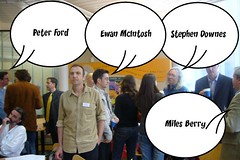2 October 02012
What I did last summer
To state the obvious, I have blogging block — a fairly chronic case of it. The reasons for this, and my abortive attempts to overcome it, are fascinating from one perspective; self-indulgent from another. Therein lies part of the riddle that has undone me. Suffice to say, for now, that I still believe in the value of reflective writing about experience, and of sharing half-formed thoughts as part of a conversation with people who share my interests. I plan to get back to it.
Lest you imagine that I have just been convolving with my navel these past months, here's a quick resumé of recent and current projects:
- Working with University of Derby Online to explore the feasibility of developing online Access to HE provision. This was a small project and in one sense it focused on a very specific question within quite a restricted canvas. In another sense it raised big issues about how to make Higher Education more accessible, less rigid and better suited to the lives of people who weren't 'bred' to be full-time students. More agile, in my terminology.
- Working with the Higher Education Academy to advise how to reorient their online resources to make them more useful to the diverse communities of practice — across HE teaching — that the Academy supports.There are subtle, but profound, changes afoot as national agencies navigate the transition from publisher-cum-gatekeeper role to being more facilitative in the era when open online resources are distributed and abundant.
- Managing a project to identify the support that scholarly socities need to make the transition to Gold Open Access publishing, which has been given a shot in the arm in the UK by the Finch Report. Our project then aims to commission or produce resources to help meet those needs for support. I'm project manager on behalf of the Association for Learning Technology (ALT), who have been commissioned by the Open Access Implementation Group.
- Also for ALT, I'm managing the Open Course in Technology Enhanced Learning project (the website hasn't been formally launched yet, so no link, but you can find it if you dig). This is also aimed at teachers in higher education, encouraging them to explore the ways they could use technology in their teaching. The course is a MOOC — Massive Open Online Course. The soul of MOOCs, whether saintly or demonic, is hotly contested at the moment, especially among learning technologists, so it's an interesting time to be designing such a course. It's due to run next year.
For all but one of these projects, I've been working with my regular collaborator Seb Schmoller. While I've been working on them — and I was also fortunate enough to be invited on two holidays this summer — my work on Agile Learning has moved on to the back burner. Most recently I got the Agile Learning wiki to the point where almost stands by itself as an introduction to the principles and practice. I also wrote a series of articles for New Media Knowledge — here's the round-up that points to the three main articles. I expect to stay with the agile theme for as long as I continue to do anything that could pass as work, but for now the Agile Learning blog, twitter, Facebook and Google+ (!) are lying mostly fallow until the season changes.
4 October 02011
What's holding Open Access publishing back?
 As a small business working in knowledge-intensive, research-driven areas, I've got first-hand experience of the frustrations caused by mainstream research publishing: you find a research paper that looks useful, but it costs $30 to read the 15 pages if you haven't got some kind of institutional subscription. These costs keep going up, and even institutions are having to look critically at what they can afford, in what is known as the serials crisis. Recently George Monbiot stirred up a small storm by drawing attention to this — see one angry reaction, for example.
As a small business working in knowledge-intensive, research-driven areas, I've got first-hand experience of the frustrations caused by mainstream research publishing: you find a research paper that looks useful, but it costs $30 to read the 15 pages if you haven't got some kind of institutional subscription. These costs keep going up, and even institutions are having to look critically at what they can afford, in what is known as the serials crisis. Recently George Monbiot stirred up a small storm by drawing attention to this — see one angry reaction, for example.
The Open Access movement in academia has been working for decades to overcome the kinds of problems I experience. As the name suggests, Open Access is committed to all research publications (and sometimes data too) being freely available to anyone for the public good. Momentum has grown in recent years as online tools have made the editorial and distribution functions of publishing much more agile. Nevertheless, there's still a sense among many Open Access advocates that progress is stalling, or at least not nearly as rapid as it might be.
At the start of the summer I was commissioned, along with Seb Schmoller and Nicky Ferguson, to do a quick piece of work to understand why Open Access was not sweeping all before it. Given the short deadlines, the brief we were given was tightly focused: after a brief literature review, we spoke only to researchers in chemistry and economics.
This constraint was frustrating in one or two senses. Palpably, of course, our literature search was less comprehensive than it would have been had Open Access been the rule rather than the exception. But at least that didn't prevent me finding Gale Moore's survey of faculty awareness and attitudes towards Open Access at the University of Toronto. I was struck there by her observations:
While scholars are central, they are only one part of a scholarly communication ecosystem that includes publishers, librarians, university administrators as well as scholarly societies, associations, funding agencies and others. Today, as the economic, social and cultural landscape is being transformed by the turn to the digital that is evident in phrases such as the networked information society or the digital economy, it is timely to ask how does this turn affect scholars and other members of the scholarly communication ecosystem on which so much depends. How aware are scholars of the opportunities and challenges posed by the digital, networked environment in which they are situated, and the implications for their activities and those of others in the system? Are they aware of how the activities of others in the ecosystem affect them? [my emphasis]
"Scholarly communication ecosystem" — there's that word again. Now here's the real frustration. Despite this acknowledgement of the wider context of research publication, almost all the research on how to spread Open Access — including Moore's and our own — seems to focus on researchers and not on the other players in the ecosystem.
Continue reading "What's holding Open Access publishing back?"1 August 02011
Round-up of recent writing in other places
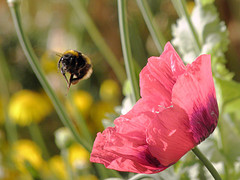 Agile learning: How 'making do' can evolve into 'making good' is my latest attempt at developing and honing what I mean by agile learning and why it's important. Written for the newsletter of the Association for Learning Technology, it's aimed at the ALT constituency which is mostly people in Higher and Further Education along with a scattering of commercial learning tech companies — and, at just over 2,000 words, it's reasonably long. One of the ideas I use as props is the learning ecosystem. Since I wrote this, Adam Curtis's TV essay picking apart the ecosystem metaphor has been broadcast in the UK. I like having my premises challenged, sometimes, and hope to explore this in a forthcoming post.
Agile learning: How 'making do' can evolve into 'making good' is my latest attempt at developing and honing what I mean by agile learning and why it's important. Written for the newsletter of the Association for Learning Technology, it's aimed at the ALT constituency which is mostly people in Higher and Further Education along with a scattering of commercial learning tech companies — and, at just over 2,000 words, it's reasonably long. One of the ideas I use as props is the learning ecosystem. Since I wrote this, Adam Curtis's TV essay picking apart the ecosystem metaphor has been broadcast in the UK. I like having my premises challenged, sometimes, and hope to explore this in a forthcoming post.
Also for ALT I contributed a short presentation to the Making the Most of Informal Learning webinar. You can watch and listen to the full recording: best experienced from the beginning (which, oddly, starts at 1 hour 9 mins on the clock) with Jane Hart and Charles Jennings presenting before me, then I come on when the clock says 1 hour 40 mins. You can also download my slides, though they make little sense without the accompanying ramblings.
I'm one of the friends of New Public Thinking, another of Dougald Hine's many interventions into learning and intellectual culture. My contribution so far is called When Should We Eat Our Brains? It's a sceptical look at the idea that getting a bunch of clever people to "co-create" is the answer to any and every problem.
The open source movement has got us into the habit of believing that "with enough eyes, all bugs are shallow". But lots of the problems we face are very different from debugging software. Solving them is more like unpicking knots. The more hands and eyes you devote to unpicking a knot, all at once, the tighter the knot gets.
This piece is a kind of companion to another I wrote last year for The Future We Deserve book, which, frustratingly, has yet to be published. You can see what I submitted, which pulls the lens even further back to ask whether we have what it takes to husband the planet, comparing the prognoses of Stuart Brand and James Lovelock.
On a completely different note, here's my review of a Trembling Bells gig in Lewisham.
Finally, I'm blogging more frequently (though erratically as ever) on the Agile Learning amplify site, plus occasionally on the Everything Unplugged group site.
Bumble bee photo by tassie.sim, licensed under Creative Commons.
18 March 02011
Purpos/ed: What's the purpose of education
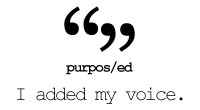 This post is my contribution to an ongoing project organised by purpos/ed, "a non-partisan, location-independent organization aiming to kickstart a debate around the question: What’s the purpose of education?" This was initiated by Doug Belshaw and Andy Stewart.
This post is my contribution to an ongoing project organised by purpos/ed, "a non-partisan, location-independent organization aiming to kickstart a debate around the question: What’s the purpose of education?" This was initiated by Doug Belshaw and Andy Stewart.
When I signed up to make the 38th contribution at the fag end of an already-extended process, I knew that it would be almost impossible to say anything original (well done, Simon, for trying), so I planned to focus on framing and connecting what had already been said. The process of doing that led me in a challenging direction.
This week, I read all the contributions that preceded this one. Two dimensions emerged fairly early on in this reading, shown in my figure below. Admittedly this is crude; not everything fits, and some occupy more than one place within it. But the differences are worth drawing out.
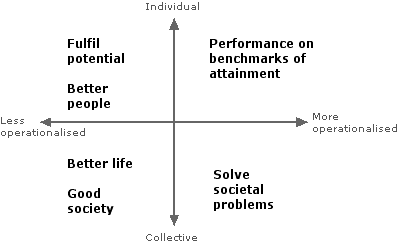
Probably the most common phrase in this debate is some variation on "fulfilling individual potential" (e.g. Jan, Lou, Mark, Zoe). I guess this reflects a focus on increasing people's self-determination, and who can argue with the desirability of that? Yet it misses the idea that individuals should strive to be part of something bigger than themselves.
Continue reading "Purpos/ed: What's the purpose of education"28 November 02008
My five mind apples
Mindapples is a social movement to promote individual self-management of mental wellbeing. The original “5-a-day” campaign encouraged people to take care of their physical health through simple daily activities, and we want to do the same thing for mental health. We aim to create a stigma-free public debate about mental wellbeing, simply by asking everybody the question: “What’s your five-a-day?” [source]
Mindapples was conceived by the very smart Andy Gibson (also one of the School Of Everything team), and he has cheekily blogtagged me to get me to publish my five-a-day.
This comes with the warning that my mind feels fairly badly inspissated at the moment, but that may be because I've not been getting all five sufficiently regularly.
- Meditation, or bathing a baby. Best to get the most embarrassing out of the way first. I've tried different types of meditation, guided either by tapes of Alan Watts or by the Meditation Trust. However, there are other methods if you don't want to come on like a new age hippy. In his Autobiographical Statement, John Cage wrote of his practice of zen buddhism, "I have never practiced sitting cross-legged nor do I meditate. My work is what I do and always involves writing materials, chairs, and tables. Before I get to it, I do some exercises for my back and I water the plants, of which I have around two hundred." A film shown at the John Cage Uncaged weekend documents this enormous array of plants above 6th Avenue, and the intricate instructions for watering them — you wouldn't have wanted to apartment-sit for him. Since I became a dad, finding time to meditate has been harder, but in its place I have the evening bath, feed and bedtime of my four-month-old son: the arrangements of bath water and thermometer, sleep suit and dummy, hot water bottle and towel, feeding bottle and LP cued up on turntable, not to mention the actual washing routine, are almost on a par with Cage's plants.
25 May 02008
On Slow Blogging
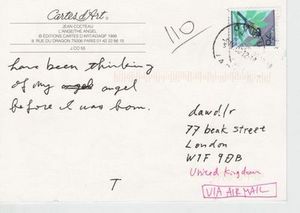 About a month ago, or maybe two, I was on the sofa at London's Social Media Cafe having a chat to David Wilcox. We had no deals to do, and no pressing initiatives to scheme about, but our interests and contacts overlap at several points, and it was a wide-ranging discussion [Update, 30 November 02008: it turns out Lloyd Davis took a photo of this chat.]. I can't remember quite how it came up, but we started to talk about our approaches to blogging, and particularly the tacit pressure to provide more or less instant comment on developments in our respective fields.
About a month ago, or maybe two, I was on the sofa at London's Social Media Cafe having a chat to David Wilcox. We had no deals to do, and no pressing initiatives to scheme about, but our interests and contacts overlap at several points, and it was a wide-ranging discussion [Update, 30 November 02008: it turns out Lloyd Davis took a photo of this chat.]. I can't remember quite how it came up, but we started to talk about our approaches to blogging, and particularly the tacit pressure to provide more or less instant comment on developments in our respective fields.
Having recently written a book about how people discover music and other media online, I'm sure my publishers would love it if I were to raise my profile as a digital pundit, passing on the latest news and maybe adding my angle to it. For example, they asked me to provide a few words on the Radiohead In Rainbows story last October.
But, as I explained to David, that kind of thing doesn't come naturally to me. I don't think my first thoughts are necessarily my best thoughts, and often it's better to let the dust settle a bit before passing opinion. For example, it was probably a few weeks before it became clear that Radiohead had made a mistake by not providing a streaming version of their album for people to try it out. As a consequence, the only way for non-die-hard fans to judge how much it was worth to them was to download it — which they did for free, rather than paying, precisely because they didn't yet know if it was worth more than that. In hindsight, I could have made a more telling, and controversial suggestion, about the failure of In Rainbows as a discovery case study, just by waiting a bit.
Maybe, said David, we need a Slow Blogging movement. That was a bit of an Aha! moment for me… but I thought I wouldn't rush into writing about it, and sure enough more useful pointers have emerged since…
Continue reading "On Slow Blogging"23 May 02007
Some tweaking to this site
I know things have been quiet here for some months, but do not despair: this site is not limping towards terminal decline; it will be back to its normal self eventually. Reculer pour mieux sauter, and all that. Probably you won't see a major burst of energy here for a couple of months, but please be patient.
In the meantime, I have been slightly more active on my book blog. To make these entries more visible here, I've created a del.icio.us account to record the entries and provide a linkroll with summaries of them, which you can see on the right hand side of the home page, about half way down.
I've also changed my feedburner RSS feed so that it now combines articles from this site with the brief del.ico.us summaries of entries on the book blog. That means it no longer includes a feed of my furl bookmarks, but that is still available separately, as before. I hope this doesn't incite a riot among those of you who subscribe to the feedburner feed (I suspect a yawn is more likely), but if it does I will reconsider.
13 February 02007
Is Yahoo clamming up: authenticity and transparency under threat?
 A year ago I praised Yahoo's music team for their openness, authentic voice and for recognising the value of conversation. By coincidence, last night, exactly a year later, I listened to Yahoo's Bradley Horowitz on IT Conversations talking about their ethic of 'opening up' in various ways. Towards the end of his talk (in the last three minutes or so), he explicitly refers to management blogging and the authentic voice as part of this.
A year ago I praised Yahoo's music team for their openness, authentic voice and for recognising the value of conversation. By coincidence, last night, exactly a year later, I listened to Yahoo's Bradley Horowitz on IT Conversations talking about their ethic of 'opening up' in various ways. Towards the end of his talk (in the last three minutes or so), he explicitly refers to management blogging and the authentic voice as part of this.
The talk was recorded last June (though I'm only aware of becoming available recently). Since then, there has been the infamous 'peanut butter' memo which aired some dirty laundry within Yahoo — not a blog, to be sure, but a leak that perhaps made Yahoo's transparency as an organisation a little uncomfortable.
That was in November. There have been only five new posts on the Yahoo Music Blog since then, and all rather impersonal, or at least uncontroversial. That compares with 18 posts last June and 15 last May.
Continue reading "Is Yahoo clamming up: authenticity and transparency under threat?"10 December 02006
Back in the blogging seat
After a couple of months of inactivity blog-wise, I'm returning to the scene, and hoping I haven't lost everyone who used to visit here.
I've actually been back in action since the beginning of the month, but mostly on other sites. Check my Net, Blogs and Rock'n'Roll blog for a couple of entries last week.
I've also set myself the task of more actively testing the water and trying to build my network on some of the music community sites. So you can find several posts about music on Last.fm, MOG, MyStrands and Vox (Vox isn't a music-specific community, but some think it could one day challenge MySpace). Yes, I've duplicated the same posts several times over on different sites. In this Web 2.0 age, that should be easier than it is, but each site has its own variant of pidgin HTML. Is it a bad idea to have the same material in different places? Let me know if you think it is. In the meantime, it's my content, and I'll do what I want with it.
This use of other outlets for writing about music will reduce what finds its way into the Cultural Calendar category of this blog. Though there will be a second in the series of unlikely CD reviews in a short while.
22 October 02006
Hibernation and software upgrade
As regular readers will have noticed, I've been posting here much less frequently in the past couple of months. This will continue at least until December, as I am being pretty single-minded about completing the first draft of my book. Normal service will return in due course.
The software that this blog runs on was upgraded last week. For most use, you won't notice any difference — at least until I start using some of the extra features now available to me. The exception to this is if you're making comments. The comment system is much better at handling comment spam, of which I get a lot. Unfortunately, though, there is a glitch at the moment: if you try to enter a comment, you will be able to preview it fine, but when you try to post it, you will end at a blank page. Although this is disconcerting and unhelpful, your comment has been registered on the system, and will appear on the site as soon as I review it. When the glitch is fixed, the comment system will also enable TypeKey registered users to post without being moderated by me.
Continue reading "Hibernation and software upgrade"16 August 02006
Trends and substitution between media platforms
Tell me if I'm misinterpreting this graph (based on an Ofcom report, via a BBC news story), but I think it's saying that the time young people spend on the net comes particularly at the expense of time they might otherwise have spent on print media (magazines, local and national newspapers). 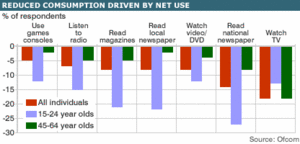 Conversely the time middle-aged people spend on the net is being subtracted most from the time they used to spend on television.
Conversely the time middle-aged people spend on the net is being subtracted most from the time they used to spend on television.
Put another way, could you say that TV retains some appeal to younger people while the middle-aged are turning it off. And they are still using print to a fair degree, a habit which many 15-24 year olds today have possibly never developed.
Continue reading "Trends and substitution between media platforms"13 August 02006
Third year web site charts
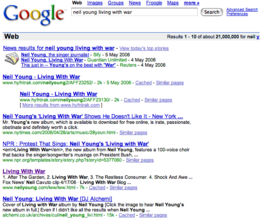
This is my annual round-up of the most commonly accessed pages on this site and the most common search terms that lead people to it. I do it every August, partly because it seems like a slow month, and partly to mark the anniversary of the site. Here are the equivalent charts for the first year and the second.
Here are the charts for this year. They are based just on the last six months, because that's how far my web logs go back.
The dominance of Neil Young in these charts requires some explanation. This comes down to the apparent vagaries of Google. In the week that Young's Living With War album was released, my posting about it was in Google's top six results for the search term "neil young living with war", outranking Young's own official blog (click the thumbnail to the right to see a larger version).
Continue reading "Third year web site charts"23 July 02006
Top online brands and the calculation of charts
My friends at Futurelab have posted their own chart of the Top 100 Online Brands, as an alternative to that provided by Interbrand (here's Interbrand's 02005 list, with the 02006 one due soon [Update, 28 July: the link to 02005 list now redirects to the 02006 list]).
What does a chart of brands mean, and to whom? I can see that the branding industry wants to identify who's doing best, and then determine how they've achieved that. But what can the rest of us learn from the results that Kodak beats Coca-Cola on Futurelab's metrics, but Coca-Cola was top of Interbrand's list? For most of us, these two brands do not overlap or compete in any part of our lives.
Continue reading "Top online brands and the calculation of charts"21 July 02006
Why is Pandora big in Beverly Hills?
An amusing little bit of trivia about Pandora, the online music discovery service that I've written about a few times (here's my most in-depth review). Yesterday's CNET News feature on Pandora mentions in passing that the most popular zip code of Pandora users is Beverly Hills' 90210.
Pandora is only licensed in the US. To use it you have to provide your US zip code, but that's the only check Pandora does on your location, I believe. So if you're outside the US, and you want to use Pandora, what are you going to do? Pick a zip code out of the air perhaps? And if you did, which zip code might come quickest to the mind of a non-US citizen? Possibly one that features in the title of an internationally syndicated soap opera? Even as someone who has never seen Beverly Hills 90210 on the TV, I am aware of it from reading TV listings. Call me cynical, but could that explain Pandora's apparent popularity in that part of California? (Of course, I don't endorse anyone falsifying their zip code. No, not me. Not a good idea.)
17 June 02006
About blog updates
If anyone reading this has experience of running two blogs that overlap in their coverage, I'd be interested in your advice on the following issue.
Much of what I write on this blog is a by-product of my work and the wider interests that surround it. At the moment my work is almost exclusively on my book, and I've created a dedicated blog for that. (I'm also trying to be focused, and to avoid spending too much time on by-products!)
Should I duplicate new articles by posting them both here and on the book blog? I did that once, but it's not ideal. Comments posted on one version are not shown on the other. I could 'close' comments for one of the versions and direct readers to the other version to make comments — but I wonder if you might find that over-complex and irritating? Let me know if you have views, or advice, one way or the other.
In the meantime, in the last fortnight I've added to my Net, Blogs and Rock'n'Roll blog an interview about discovering classical music via a dedicated broadband TV channel and an assessment of MusicStrands' new tool for recommending music tracks and artists based on film titles. If you normally read this blog with an RSS newsreader, I recommend also subscribing to the RSS feed for the book blog.
3 June 02006
Blogging, learning, and going off at tangents
I start off questioning the value of blogging an event that you know in advance will be blogged to death from every side. Does it really help anyone to have multiple perspectives on one thing, when the inevitable inconsistencies between them may be confusing? And if there are six accounts already, what added value is there in a seventh?
And then the penny drops, and I realise how to answer my question: I'm not doing this just for your benefit, dear reader, I'm doing it for mine. It's a means of consolidating my reflections. I leave them on my doorstep, and if you pass by and find them interesting, so much the better. But I'm under no obligation. Did you think I was aiming to be 'customer-centred'? Pay me some money, become a customer, and I might be. Until then, if there's no value in this for you, well, you can have a refund. For blogs to have an authentic voice, people have to speak first as citizens, not try and fit what they say into customer/supplier roles.
All of which is a lengthy preamble to a few comments I wasn't expecting to make on yesterday's blog.ac.uk conference.
Continue reading "Blogging, learning, and going off at tangents"29 May 02006
Now appearing on Futurelab's blog
Futurelab, the Brussels-based marketing and strategy innovation company (not to be confused with NESTA Futurelab in the UK), are now syndicating some of the articles from this blog on their site — see their announcement today.
Futurelab's blog assembles the best articles from a group of fifteen bloggers (so far; I am the most recent addition). I say 'the best' — the selection of articles is all down to them; it's interesting to me to see what other people see as interesting… Here's a full list of the twelve articles of mine on Futurelab's blog at the time of writing. (A small note about the Spectator article: I'm about to make the full version freely available when I get a few minutes.)
Continue reading "Now appearing on Futurelab's blog"14 October 02005
Adelphi Charter on creativity, innovation and intellectual property
The Adelphi Charter was launched at the RSA yesterday evening. The RSA convened an international commission to draft the charter, and will now lobby governments to adopt its nine principles in practice as well as in principle.
Unfortunately those principles are so far available only in PDF format (12 KB download). They're bold and clear in their resistance to increasingly protectionist tendencies in intellectual property. As the RSA Journal put it, the charter is based on "the recognition that the vital balance between the public domain and private rights, between encouraging creativity and protecting private ownership and control of information, has tipped too far in favour of rights-owners".
Continue reading "Adelphi Charter on creativity, innovation and intellectual property"11 September 02005
Re-shaping The Guardian and the failed promise of personalisation
 The Guardian newspaper is re-designing itself, turning to a format that is midway between tabloid and broadsheet, with a new typeface. Back in 01994, The Guardian produced a projection of how it thought it might look ten years later — as pictured on the left. Here's a comparison between the projection and the reality, in a similar spirit to the reviews of user interface projections I did a couple of years ago (1, 2).
The Guardian newspaper is re-designing itself, turning to a format that is midway between tabloid and broadsheet, with a new typeface. Back in 01994, The Guardian produced a projection of how it thought it might look ten years later — as pictured on the left. Here's a comparison between the projection and the reality, in a similar spirit to the reviews of user interface projections I did a couple of years ago (1, 2).
The projected prototype is more or less A4 size (same height, and about 2mm narrower). It's printed on DuPont Tyvek ®, which is water and tear resistant. The web site claims it is "ideal for all printing applications where durability is of prime importance", and certainly my nearly-11-year-old copy shows no sign of wear (though I tried to iron it flat to get a better photo, and it reacted spectacularly but disastrously to the heat). When 'delivered' the paper is folded in two, lengthways — as shown in the picture — so it would fit in an inside jacket pocket, but the pages open out to A4.
Continue reading "Re-shaping The Guardian and the failed promise of personalisation"8 September 02005
New section archives
I've gone through all the 279 entries on this site and classified them according to 14 new 'secondary' categories, which complement the primary categories included as tabs on each page (E-learning, Human-Computer Interaction, Music & Multimedia, Cultural Calendar). And I've changed the home page so that it links to these 'Section Archives' instead of the old month-by-month archives — see the right-hand panel about half-way down.
Navigating this site by date doesn't make a lot of sense, since it's not a diary: it just shows the progression of my ideas, which isn't always forwards! So adding a richer set of classifications has been on my to-do list for the best part of a year. When I started the site I didn't want to pre-empt the sections too much, as I wasn't sure how the coverage was going to evolve. And I'm still going to stick to using at least one of the 'primary' categories for the great majority of entries (except personal and reflexive ones like this).
The new section categories give you the scope to find all the entries on more specific themes and topics that I cover here. Some of them are fairly general like Radio or the Future of Music; others are more tightly focused, like the BBC or Playlists. I've used the Ideas and Essays section to collect together all the more substantial entries, the ones I think are most original, so I'd recommend giving that a look.
If you would find any other section categories useful for navigating the entries here, please let me know and I'll see what I can do.
25 August 02005
Second year web site charts
August is the 'silly season' for news and also the anniversary of this site launching in earnest. Last year I posted some 'charts' for the most accessed pages and the most common search terms that led people to this site. Here is the hit parade for this year (based on statistics from the last six months).
Continue reading "Second year web site charts"2 July 02005
Furl shared bookmarks (and hiatus)
Due to other commitments, it's unlikely that I'll be posting new entries here until the second half of July.
In the meantime, a quick reminder about my collection of Furl bookmarks, to mark the fact that I recently passed the 1,000 figure since I started organising them.
Continue reading "Furl shared bookmarks (and hiatus)"30 June 02005
Launch of the Network Users' Forum, ten years ago
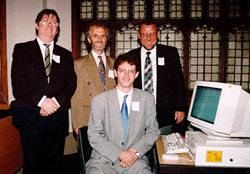 Ah, but I was so much older then, I'm younger than that now. That's me, sitting down in the suit — clean-cut, respectable and still the right side of thirty — on 30 June 01995. Standing behind me are (from left) Ian Gow, Pro-vice Chancellor at University of Sheffield, Mike Bower, then leader of Sheffield City Council, and Richard Caborn MP. We were photographed at the launch of the Sheffield Network Users' Forum, attended by 150-200 people at St George's Lecture Theatre, a converted church owned by the University.
Ah, but I was so much older then, I'm younger than that now. That's me, sitting down in the suit — clean-cut, respectable and still the right side of thirty — on 30 June 01995. Standing behind me are (from left) Ian Gow, Pro-vice Chancellor at University of Sheffield, Mike Bower, then leader of Sheffield City Council, and Richard Caborn MP. We were photographed at the launch of the Sheffield Network Users' Forum, attended by 150-200 people at St George's Lecture Theatre, a converted church owned by the University.
At the time, this was the largest public meeting at which people from communities, business and education came together in Sheffield to share ideas and experiences of applying the Internet to their lives. The Sheffield Network Users' Forum — quickly re-branded as just the Network Users' Forum (NUF) in a vain attempt to avoid South Yorkshire identity politics — was an idea I seeded and grew through the Information Communications Technology group of the City Liaison Group (now Sheffield First).
Continue reading "Launch of the Network Users' Forum, ten years ago"23 May 02005
Tufte, PowerPoint and oratory
As a result of today's BBC strike, my normal lunch-break listening of The World at One was replaced by a short documentary called Microsoft Powerpoint and the decline of Civilisation.
Continue reading "Tufte, PowerPoint and oratory"7 April 02005
Happy Birthday Frukt!
From today's Five Eight daily email:
It's our birthday today. We are four. To celebrate, we ask that your gift to us is that you let any colleagues/friends/contacts or clients know about us. It isn't always easy being the little guy, so please know that your support of FRUKT/Five Eight is very much appreciated.
They're offering a free trial of their news service. And they're having a party tonight. I like them for their open and generous spirit.
30 March 02005
I am fifty-quid-bloke, plus inflation
Oh dear, not yet forty, and I've already become the stereotype: the kind of man who regularly spends fifty quid a week on culture, as originally coined a year or two ago by David Hepworth. For the first time I've broken the fifty quid barrier: I spent an average of £51.10 in the year to 28 February 02005.
That £51.10 breaks down to £14.39 on CDs, a smattering of vinyl, a handful of DVDs (mostly music-related) and even 60 pence or so per week on those MP3 thingies; £26.17 on gigs (down from over £30 last year, my first in London); and £10.53 on books, film and theatre. You can add another £4.38 per week to that if you include art objects.
Yes, it is obsessive and a little disturbing not only to spend that money but also to count it so assiduously. I have to keep a handle on a habit that teeters towards the absurd: a few years ago I was buying CDs faster than I could listen to them. I was effectively building a private catalogue for my own personal subscription service à la Rhapsody etc.
1 March 02005
Does Google have something against wikis?
This site does pretty well on its Google rankings, especially if the search uses terms that are in my title tags. Usually I get a top 10 ranking within 48 hours of posting: try googling Eno Blair or BBC Interactive Music Player, for example. By comparison, my 69 Love Songs wiki site — which has been around for six months now and has several other sites linking to it — ranks 267 when googling 69 Love Songs, or 49 if you restrict the search to UK sites.
Continue reading "Does Google have something against wikis?"16 February 02005
Twelve thousand people are buried here
 Until this week there was a playground here. You may be able just to make out the yellow seats of a see-saw, slightly to the left of the centre of the picture. But on Monday the sounds of innocent play mingled with the incipient bullying of older children were replaced by buzz saws and diggers.
Until this week there was a playground here. You may be able just to make out the yellow seats of a see-saw, slightly to the left of the centre of the picture. But on Monday the sounds of innocent play mingled with the incipient bullying of older children were replaced by buzz saws and diggers.
This is the view out of my window, and over the next four months I shall have to get used to a different aural landscape. The good news is that when the work is over — in June or July — we'll have an even better public space, including a 'quiet garden' under the beautiful old plane tree (some branches of which are visible on the left of the picture). Here's a plan of how it's intended to be laid out (the window from which the picture was taken is about a third of the way up the left-hand side of the plan).
The area in the foreground has been in Quaker ownership since 1661, and, between then and 1855, 12,000 people were buried here in unmarked graves, including George Fox, founder of the movement (see more details). In fact, the area had already been used for burials before that, the name Bunhill being derived from 'Bone Hill'.
Continue reading "Twelve thousand people are buried here"9 January 02005
Bill makes it chic to be a communist again
I'm a bit behind the breaking news here, but this Wired News article brought me up to speed on how Bill Gates has branded those who propose reforms to intellectual property regulation, to adapt them to the Internet age, as "modern-day sort of communists".
He further asserts that these people "want to get rid of the incentive for musicians and moviemakers and software makers". Apparently he hasn't heard about the many musicians and moviemakers and software makers who seem fairly motivated to produce work under a more flexible set of terms. As the blurb for the Wired Creative Commons CD says, "When it comes to copyright, [these musicians] are pro-choice".
As a term, 'communism' has lost its sting, so Bill's John Birch Society rhetoric has, in many quarters, had the opposite to the intended scare effect. People are producing 'creative commies' t-shirts, button badges and all sorts. Every cultural movement needs an easy-to-lampoon, high profile opponent that it can define itself in opposition to, and Bill's brand of pullover-and-slacks blinkered denial provides just that.
30 December 02004
Why I'm boycotting Picturehouse Cinemas and the Brixton Ritzy
You can file this under 'disgruntled customers' and 'name & shame', though it's also a case of failure in responsiveness and the breach of trust this creates, as covered in my posting on e-commerce usability.
The story is a simple, one-sided tale that starts with an annoying but modest failure and ends up escalating to farce, as the organisation concerned advertises communication channels but does not respond to any messages sent via these channels.
Continue reading "Why I'm boycotting Picturehouse Cinemas and the Brixton Ritzy"13 November 02004
Interval
It's unlikely that I'll be posting any new articles here in the next ten days or so, due to other commitments. Normal service will resume towards the end of the month.
26 October 02004
Thanks for more than a lifetime contribution
Outside the tube station I saw people stop and point with open mouths at the Evening Standard news boards that read 'DJ John Peel Dies'.
The last time I heard John Peel's voice on the radio — I don't know if it was the last time he was broadcast before he died — was two nights ago on Andy Kershaw's programme. Andy played a tape of a twenty-year-old John Peel programme where John introduced, uncannily, the song They're Cutting my Coffin at the Sawmill. (If you have the stomach, you can hear this until next Sunday.) Someone had written in pestering Andy to play the song, believing that Andy had himself played it in the '80s, though he had no recollection of it. Another listener realised that it was actually John Peel that had played the song (mentioning Andy with customary generosity when introducing it) and that listener had kept his tape of the programme for the last twenty years. There are a million stories like that. Before the age of the Internet you could walk into a West Berlin bookshop where they'd be playing imported tapes of his programmes.
Though it's shocking to have an apparently limitless, unending stream of great radio come to a sudden stop, no-one can say that John Peel sold anyone short. We can only be enormously grateful for all the lives that he wove his way into.
18 September 02004
Me and Mr Mu

 I went to the Planet Mu album launch gig last night — courtesy of a Mixing It competition I won — and someone asked me if I was Mike Paradinas (a.k.a. µ-Ziq, and founder of Planet Mu Records). Hmmm. Well it's better than being compared to Hugh F'ing-Whittingstall.
I went to the Planet Mu album launch gig last night — courtesy of a Mixing It competition I won — and someone asked me if I was Mike Paradinas (a.k.a. µ-Ziq, and founder of Planet Mu Records). Hmmm. Well it's better than being compared to Hugh F'ing-Whittingstall.
16 August 02004
Web site charts
It's a year since I started running this site. I don't think there was a clear-cut launch date, but 15 August sticks in my mind as the first time I started posting in 'real time' (postings with dates earlier than that were added retrospectively to pad out the site in the early days).
Here are some notes on the most popular resources and searches.
Continue reading "Web site charts"12 June 02004
3 May 02004
Dartmoor
 Here are a couple of pictures taken yesterday on Dartmoor, with the quality compromised even more than usual owing to the difficulty of seeing anything on the 'viewfinder' on my phone in the sunlight.
Here are a couple of pictures taken yesterday on Dartmoor, with the quality compromised even more than usual owing to the difficulty of seeing anything on the 'viewfinder' on my phone in the sunlight.
 Click on the images to be taken to much better photographs and details of the sites courtesy of the Modern Antiquarian site.
Click on the images to be taken to much better photographs and details of the sites courtesy of the Modern Antiquarian site.
23 March 02004
Schadenfreude isn't in MS Word's dictionary...
... so Microsoft won't understand how I feel about the fines the EU wants to impose on them. There's a generation of computer users who have come to assume that the bugs, glitches and security holes in Microsoft's applications software are just an intrinsic feature, and all software is like that. Not true.
20 February 02004
Notes for broadband service providers
I was at the ISP Forum most of last week, representing Wired Workplace. The main theme of the event, which is close to our hearts, is how to make a profit from selling broadband services. Here are a few headline facts and opinions (most, but not all of them, are taken from a briefing by Tim Johnson of Point-Topic, but any errors are more likely to be down to my misunderstanding than to Tim or others).
Continue reading "Notes for broadband service providers"18 January 02004
Intermission for genre compliance
This is a 'blog' site, right? At least, it runs on software designed to support blogs. And that brings with it certain 'genre' expectations. Like: you're supposed to provide links to off-the-wall sites that you're friends haven't found yet, and make comments on them that walk a thin line between ephemera and profundity.
Unfortunately this doesn't really play to my, err, strengths, or, by and large, my interests. But Dick Moore has been kind enough to use the suggest a link feature to recommend the nobodyhere.com site. I add my comments to Dick's: "No doubt you have seen this" (I hadn't) "it won an award on the weebies last year" (the what?) "I loved it" (I trust Dick's taste) "but is it art ;-)" (I am feeling less secure about my own).
As dessert, let me also throw in the Read My Lips link, with a special recommendation for the Bush/Blair love duet. No doubt you already know this, but Lawrence Lessig uses this clip to illustrate his case for encouraging the 'remix culture' — by avoiding excessive protection from re-purposing of cultural material. Normal service will now resume.
28 December 02003
Spam for Christmas
According to a feature on BBC News, "40% of emails sent are thought to be spam" and "British workers spend up to an hour a day clearing their inboxes of junk e-mails."
I've been away from my desk for just under 100 hours over Christmas. During which time 596 messages hit my in-box. Of these 575 were filtered out by Spamfire (one incorrectly, a bulk mailing coming from a genuine contact who was using a different email address from usual). Of the 21 that were not filtered, eight were in fact spam. That means 97.7% of my Christmas email was spam. Ho, Ho, Ho! (But I only spent five minutes dealing with it.)
12 December 02003
Moving
I'm effectively shutting up shop for a few days as I move home and office. I'm not quite there yet, but I've updated my full contact details, so please note these if you're interested!
17 November 02003
Imminent relocation of office and home
 Just confirmed today: this is where I'll be living and working in a few weeks' time (once I've got all the necessary communications installed). My new address will be 14 Chequer Court, 3 Chequer Street, London EC1Y 8PW — it's just 150m from where William Blake is buried (map), but until the final move date is confirmed, please keep using my current contact details. (Photograph © Urban Spaces, 2003.)
Just confirmed today: this is where I'll be living and working in a few weeks' time (once I've got all the necessary communications installed). My new address will be 14 Chequer Court, 3 Chequer Street, London EC1Y 8PW — it's just 150m from where William Blake is buried (map), but until the final move date is confirmed, please keep using my current contact details. (Photograph © Urban Spaces, 2003.)
12 September 02003
Pensions Solutions in the Creative Sector?
When I was 12 and Kate Bush was enjoying her fourth or fifth week at Number 1 with Wuthering Heights, my dad told me that the smart move was not to have a Number 1 single, because all your earnings would be concentrated into a short period and you'd lose them all in tax (the top tax rate at the time was 83%). It would be much better, he said, to write something like a school text book that would sell in steady amounts year-in, year-out, creating a regular income under the radar of the Inland Revenue.
I remembered this when I read that Paul Morley earns a farthing every time Charlie's Angels — Full Throttle is shown or trailed. The film uses a song, which samples another song, which Morley co-wrote twenty years ago. An unexpected little earner to help him feed the electricity meter.
Continue reading "Pensions Solutions in the Creative Sector?"8 September 02003
In Dreams, I Walk With Metadata
Last night I had one of those out-of-the-body dreams, waking up with the feeling that I'd been contacted by some alternative form of intelligence.
Looking back in the cold light of day, I realised that this form of intelligence was in fact a parable for standardised metadata, a viral meme with a whiff of the occult about it.
Continue reading "In Dreams, I Walk With Metadata"2 September 02003
David Kelly and the Baha'i Faith
Interesting to see the attention given to the Baha'i Faith since it has emerged from the Hutton Enquiry that David Kelly joined the religion in 1999.
I nearly became a Baha'i in 1995, intrigued to learn more after attending a Baha'i wedding, and again in 1999. In crude terms, the Faith is non-sexist, pacifist and internationalist, actively encourages co-operation with all other religions, and its organisation is — in management-speak — flat and fairly non-hierarchical. It's also committed to avoiding what might be called evangelical recruitment methods to grow its numbers: no emotional arm-twisting or moral blackmail.
Continue reading "David Kelly and the Baha'i Faith"
Subscribe to my RSS feed, which covers this blog, my book blog, and further commentary on other web resources (more feeds below)
What's holding Open Access publishing back?
Round-up of recent writing in other places
Purpos/ed: What's the purpose of education
My five mind apples
On Slow Blogging
Some tweaking to this site
Is Yahoo clamming up: authenticity and transparency under threat?
Back in the blogging seat
Hibernation and software upgrade
Trends and substitution between media platforms
Third year web site charts
Top online brands and the calculation of charts
Why is Pandora big in Beverly Hills?
About blog updates
Cinema (24)
Cultural Calendar (87)
Curatorial (66)
E-learning (103)
Events (35)
Future of Music (95)
Human-Computer Interaction (62)
Ideas and Essays (38)
Long Now (18)
Miscellany (45)
Music and Multimedia (157)
Playlists (27)
Podcasting (12)
Politics (12)
Radio (48)
Reviews (59)
Social Software (60)
Teaching (23)
Alternatively, see the Date-based Archives
Recommended: RSS feed that combines items on this site, my book blog, and commentary on other web resources
RSS feed for this site only
RSS feed for my book, Net, Blogs and Rock'n'Roll
RSS feed for shared bookmarks
My latest bookmarks (click 'read more' for commentary):
My archived bookmarks (02004-02008)
On most social sites I am either 'davidjennings' or 'djalchemi', for example: Flickr, Last.fm, Ma.gnolia and so on…
Lateral Action — managing creativity
Herd — social cognition
Seb Schmoller's e-learning mailings
Viridian Design Movement
Tom Phillips — artist
Long Now blog — resources for long-term thinking
Longplayer live stream — 1,000-year composition

The contents of this site are licensed under a Creative Commons Licence except where otherwise notified.
Hosted by Paul Makepeace
W3C Standards
Check whether this page is valid XHTML 1.0
Check whether the CSS (style sheet) is valid

